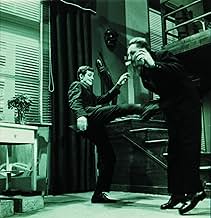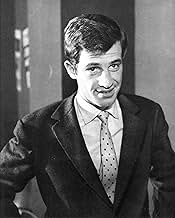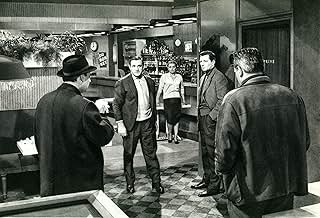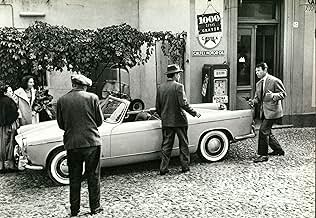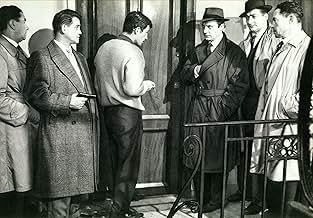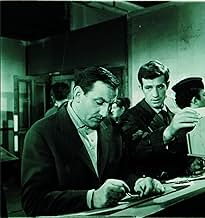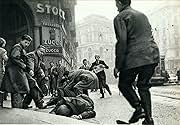AVALIAÇÃO DA IMDb
7,5/10
4,8 mil
SUA AVALIAÇÃO
Adicionar um enredo no seu idiomaA ruthless criminal flees from the pursuit, involving more and more casualties.A ruthless criminal flees from the pursuit, involving more and more casualties.A ruthless criminal flees from the pursuit, involving more and more casualties.
- Direção
- Roteiristas
- Artistas
Simone Desmaison
- Thérèse Davos
- (as Simone France)
Jean-Pierre Zola
- Le patron de l'agence privée
- (as J.P. Zola)
Philippe March
- Jean Martin
- (as Aimé de March)
Avaliações em destaque
10urigafni
Odd one should be able to stumble into "Classe Tous Risques" only by chance; it should be on any "best of film-noir" list, including IMDb's.
Lino Ventura is as good as ever; knowing of his dire, delicate family situation gives extra weight to his almost expressionless face and brief dialogues. Belmondo's restrained performance under Sautet's firm direction only shows what a wonderful actor he could - and should -have been.
"Classe Tous Risques" is utterly mininal, dry and cold, without Melville's artistic scenery, pretty faces and fancy cars. It is almost film-noir meet neo-realism. Davos' few, hard words to his children describing their life of secrecy from there on get a hold on your throat to the end of the film.
The final sentence of the film - a voice-over telling of Davos' end in no more than ten dry, sombre words - leaves you with a hard punch in the stomach.
A true jewel in the great crown of French film-noir.
Lino Ventura is as good as ever; knowing of his dire, delicate family situation gives extra weight to his almost expressionless face and brief dialogues. Belmondo's restrained performance under Sautet's firm direction only shows what a wonderful actor he could - and should -have been.
"Classe Tous Risques" is utterly mininal, dry and cold, without Melville's artistic scenery, pretty faces and fancy cars. It is almost film-noir meet neo-realism. Davos' few, hard words to his children describing their life of secrecy from there on get a hold on your throat to the end of the film.
The final sentence of the film - a voice-over telling of Davos' end in no more than ten dry, sombre words - leaves you with a hard punch in the stomach.
A true jewel in the great crown of French film-noir.
10Dziga7
I saw this film at Telluride Film Festival in 1997, where one of the screenwriters, José Giovanni, was being honored. It ranks highly as a great noir-crime-drama, incredible performances by Belmondo and Lino Ventura. The attention given to every character, and complex psychological portrayals, detailing loyalty, treachery, love, and hope, are tremendous. It is an excellent drama, an excellent thriller, and an excellent film. Up there with the best of Melville. (The title in English 'Class all risk,' in French 'Classe tous risques' is word-play on 'Classe Touriste,' meaning 'Tourist Class'.
"Classes tous risques" is one of the best "gangsters" films noirs France has ever produced.Perfect cast :Lino Ventura,a young Jean -Paul Belmondo (who made "a bout de souffle",Godard's thing, the same year),Marcel Dalio and a fine supporting cast ;brilliant script by José Giovanni -who also wrote "le trou" Becker's masterpièce the same year!What a year for him!;wonderful black and white cinematography by Ghislain Cloquet.And taut action,first-class directing by Claude Sautet,who surpasses Jean-Pierre Melville .Whereas the latter films gangsters movie with metaphysical pretensions,which sometimes lasts more than two hours,Claude Sautet directs men of flesh and blood,and the presence of the two children adds moments of extraordinary poignancy which Melville has never been able to generate .And Sautet avoids pathos,excessive sentimentality:the last time Ventura sees his children,coming down in the metro (subway)is a peak of restrained emotion.
Ventura portrays a gangster whose die is cast when the movie begins.He thinks that he can rely on his former acquaintances ,but they are all cowards -we are far from manly friendship dear to Jacques Becker ("touchez pas au grisbi" ) which Melville was to continue throughout the sixties-sometimes abetted by mean women (the film noir misogyny par excellence),living in a rotten microcosm,ready to inform on -we are far from Jean Seberg's simplistic behavior in Godard's "opus"-.
Cloquet works wonders with the picture:the scene on the beach in a starless night when the two children see their mother die after the shoot-out with the customs officers is absolutely mind-boggling.
There's a good use of voice-over,which Sautet only uses when necessary;thus ,the last lines make the ending even stronger than if we have attended the scenes.
Claude Sautet had found a good niche ,and he followed the "classes tous risques" rules quite well with his follow-up "l'arme à gauche" (1965) which featured Ventura again and made a good use of a desert island and a ship.Had he continued in that vein,France would have had a Howard Hawks.In his subsequent works ,only "Max et les ferrailleurs " (1971) showed something of the brilliance he displayed in the first half of the sixties.He had become ,from "les choses de la vie" onwards,the cinema de qualité director who used to focus on tender-hearted bourgeois in such works as "Cesar et Rosalie" (1972),"Vincent François ,Paul et les autres" (1974) or "Mado" (1976)
Ventura portrays a gangster whose die is cast when the movie begins.He thinks that he can rely on his former acquaintances ,but they are all cowards -we are far from manly friendship dear to Jacques Becker ("touchez pas au grisbi" ) which Melville was to continue throughout the sixties-sometimes abetted by mean women (the film noir misogyny par excellence),living in a rotten microcosm,ready to inform on -we are far from Jean Seberg's simplistic behavior in Godard's "opus"-.
Cloquet works wonders with the picture:the scene on the beach in a starless night when the two children see their mother die after the shoot-out with the customs officers is absolutely mind-boggling.
There's a good use of voice-over,which Sautet only uses when necessary;thus ,the last lines make the ending even stronger than if we have attended the scenes.
Claude Sautet had found a good niche ,and he followed the "classes tous risques" rules quite well with his follow-up "l'arme à gauche" (1965) which featured Ventura again and made a good use of a desert island and a ship.Had he continued in that vein,France would have had a Howard Hawks.In his subsequent works ,only "Max et les ferrailleurs " (1971) showed something of the brilliance he displayed in the first half of the sixties.He had become ,from "les choses de la vie" onwards,the cinema de qualité director who used to focus on tender-hearted bourgeois in such works as "Cesar et Rosalie" (1972),"Vincent François ,Paul et les autres" (1974) or "Mado" (1976)
I have just watched on Italian TV the excellent crime drama CLASSE TOUS RISQUES (1960; aka: THE BIG RISK), directed by Claude Sautet and starring the late Lino Ventura (in one of his best roles) and a very young Jean-Paul Belmondo.
This film came out at the tail end of a string of French gangster thrillers of the 50s, the most famous of which was, of course, Jules Dassin's seminal DU RIFIFI CHEZ LES HOMMES (1954; aka: RIFIFI). I haven't watched RIFIFI in a long time but I plan to acquire the Criterion DVD some time or other. In fact, I have only postponed it, really, because of the reported audio-synch problem present on the disc's first pressings and, being a non-U.S. resident, Criterion's policy dictates that no defective discs delivered outside Region 1 territories can be replaced! Still, in light of THE BIG RISK, I may risk it [sic] all the same!
When the film came out it converged with a spate of Nouvelle Vague releases including Jean-Luc Godard's A' BOUT DE SOUFFLE (1960; aka: BREATHLESS) starring, of course, Jean-Paul Belmondo himself. It is easy to assume that his characterization in THE BIG RISK is nowhere near as iconic as his Laszlo Kovacs in Godard's film, but after all his is a supporting role (albeit pulled off with confidence and charm) and he is all too obviously overshadowed by the underrated Ventura, who dominates the film from beginning to end. Ventura was a regular in gangster films of the period: he was in Jacques Becker's masterful TOUCHEZ PAS AU GRISBI (1953; aka: HANDS OFF THE LOOT!) playing the main villainous role and in which he conducts an effective vis-à-vis with nominal star Jean Gabin, but he then took the lead for Jean-Pierre Melville's magnificent thriller set in WWII, L'ARMEE' DES OMBRES (1969; aka: ARMY OF SHADOWS).
Incidentally, next week Criterion will release Melville's BOB LE FLAMBEUR (1955) and I hope they can put their hands on other films by this French master, notably LES ENFANTS TERRIBLES (1950), from the play by Jean Cocteau; LE DEUXIEME SOUFFLE (1966; aka: SECOND BREATH), also starring Lino Ventura; LE SAMOURAI (1967), his undisputed chef d'oeuvre; the aforementioned L'ARMEE' DES OMBRES and LE CERCLE ROUGE (1970; aka: THE RED CIRCLE). It is worth noting that the last two may very well be future Criterion DVDs. For the record, I have recorded ENFANTS, SAMOURAI, ARMEE' and CERCLE (which I have yet to watch) off French TV, along with the atypical LEON MORIN, PRETRE (1961) and the little-seen LE DOULOS (1962; aka: THE FINGER MAN), both of which star Jean-Paul Belmondo.
To go back to THE BIG RISK, it was dismissed at the time as old-fashioned in light of the Nouvelle Vague, though the few stylistic touches it has are effective exactly because they are sparse and unexpected. After an explosive start, the film relaxes its grip for the first half in order to establish plot (somewhat unusual in its emphasis on the domestic problems of gangsters) and characterization (particularly in eliciting audience sympathy for the lone anti-hero). The plot does have its improbable turns: for example, Belmondo's and Sandra Milo's characters are a bit too good to be true, aiding Ventura without batting an eyelid (despite the obvious danger involved) just minutes after making his acquaintance, while the ending is a bit of a letdown (the film is abruptly interrupted and the plot resolved with a hurried voice-over explanation)...but Ventura's solid performance as a man betrayed, quietly desperate at first but driven eventually to sudden eruptions of violence, holds the film firmly together and makes THE BIG RISK a classic of its kind.
Other films by Claude Sautet I have watched are LES CHOSES DE LA VIE (1969), MAX ET LES FERRAILLEURS (1971; aka: MAX AND THE SCRAP-MONGERS), CESAR ET ROSALIE (1972), all on Italian TV, and VINCENT, FRANCOIS, PAUL ET LES AUTRES (1974), which I have recorded off French TV. All of these are low-key yet very interesting and thought-provoking films, aided a great deal by a superb selection of actors (Michel Piccoli in CHOSES, MAX and VINCENT; Romy Schneider in the first three titles; and Yves Montand in the last two). VINCENT, FRANCOIS, PAUL ET LES AUTRES is perhaps Sautet's best film: it co-stars Serge Reggiani, Gerard Depardieu (one of his first), Marie Dubois and Stephane Audran (an extended cameo, really, but effective nonetheless).
As I have said, I wish that some of the films I mentioned by Claude Sautet and Jean-Pierre Melville, including of course THE BIG RISK, will one day be released on DVD. Supplements for such films may be hard to come by, I guess, but a quality print in the Original Aspect Ratio with a transfer to match are the least we could expect for them. I know that some of the above-mentioned films are already available on French Region 2 DVD but unfortunately most of them do not carry English subtitles. Although I do have quite a basic knowledge of the French language, I am still not fluent enough to get by without any subtitles. However, I would very much like to read your opinions of French Region 2 DVDs and will affect a search through the Mobius archives for that purpose, though I may still have to post my queries about particular French DVDs which I am interested in purchasing in a new thread in this Forum in the near future.
This film came out at the tail end of a string of French gangster thrillers of the 50s, the most famous of which was, of course, Jules Dassin's seminal DU RIFIFI CHEZ LES HOMMES (1954; aka: RIFIFI). I haven't watched RIFIFI in a long time but I plan to acquire the Criterion DVD some time or other. In fact, I have only postponed it, really, because of the reported audio-synch problem present on the disc's first pressings and, being a non-U.S. resident, Criterion's policy dictates that no defective discs delivered outside Region 1 territories can be replaced! Still, in light of THE BIG RISK, I may risk it [sic] all the same!
When the film came out it converged with a spate of Nouvelle Vague releases including Jean-Luc Godard's A' BOUT DE SOUFFLE (1960; aka: BREATHLESS) starring, of course, Jean-Paul Belmondo himself. It is easy to assume that his characterization in THE BIG RISK is nowhere near as iconic as his Laszlo Kovacs in Godard's film, but after all his is a supporting role (albeit pulled off with confidence and charm) and he is all too obviously overshadowed by the underrated Ventura, who dominates the film from beginning to end. Ventura was a regular in gangster films of the period: he was in Jacques Becker's masterful TOUCHEZ PAS AU GRISBI (1953; aka: HANDS OFF THE LOOT!) playing the main villainous role and in which he conducts an effective vis-à-vis with nominal star Jean Gabin, but he then took the lead for Jean-Pierre Melville's magnificent thriller set in WWII, L'ARMEE' DES OMBRES (1969; aka: ARMY OF SHADOWS).
Incidentally, next week Criterion will release Melville's BOB LE FLAMBEUR (1955) and I hope they can put their hands on other films by this French master, notably LES ENFANTS TERRIBLES (1950), from the play by Jean Cocteau; LE DEUXIEME SOUFFLE (1966; aka: SECOND BREATH), also starring Lino Ventura; LE SAMOURAI (1967), his undisputed chef d'oeuvre; the aforementioned L'ARMEE' DES OMBRES and LE CERCLE ROUGE (1970; aka: THE RED CIRCLE). It is worth noting that the last two may very well be future Criterion DVDs. For the record, I have recorded ENFANTS, SAMOURAI, ARMEE' and CERCLE (which I have yet to watch) off French TV, along with the atypical LEON MORIN, PRETRE (1961) and the little-seen LE DOULOS (1962; aka: THE FINGER MAN), both of which star Jean-Paul Belmondo.
To go back to THE BIG RISK, it was dismissed at the time as old-fashioned in light of the Nouvelle Vague, though the few stylistic touches it has are effective exactly because they are sparse and unexpected. After an explosive start, the film relaxes its grip for the first half in order to establish plot (somewhat unusual in its emphasis on the domestic problems of gangsters) and characterization (particularly in eliciting audience sympathy for the lone anti-hero). The plot does have its improbable turns: for example, Belmondo's and Sandra Milo's characters are a bit too good to be true, aiding Ventura without batting an eyelid (despite the obvious danger involved) just minutes after making his acquaintance, while the ending is a bit of a letdown (the film is abruptly interrupted and the plot resolved with a hurried voice-over explanation)...but Ventura's solid performance as a man betrayed, quietly desperate at first but driven eventually to sudden eruptions of violence, holds the film firmly together and makes THE BIG RISK a classic of its kind.
Other films by Claude Sautet I have watched are LES CHOSES DE LA VIE (1969), MAX ET LES FERRAILLEURS (1971; aka: MAX AND THE SCRAP-MONGERS), CESAR ET ROSALIE (1972), all on Italian TV, and VINCENT, FRANCOIS, PAUL ET LES AUTRES (1974), which I have recorded off French TV. All of these are low-key yet very interesting and thought-provoking films, aided a great deal by a superb selection of actors (Michel Piccoli in CHOSES, MAX and VINCENT; Romy Schneider in the first three titles; and Yves Montand in the last two). VINCENT, FRANCOIS, PAUL ET LES AUTRES is perhaps Sautet's best film: it co-stars Serge Reggiani, Gerard Depardieu (one of his first), Marie Dubois and Stephane Audran (an extended cameo, really, but effective nonetheless).
As I have said, I wish that some of the films I mentioned by Claude Sautet and Jean-Pierre Melville, including of course THE BIG RISK, will one day be released on DVD. Supplements for such films may be hard to come by, I guess, but a quality print in the Original Aspect Ratio with a transfer to match are the least we could expect for them. I know that some of the above-mentioned films are already available on French Region 2 DVD but unfortunately most of them do not carry English subtitles. Although I do have quite a basic knowledge of the French language, I am still not fluent enough to get by without any subtitles. However, I would very much like to read your opinions of French Region 2 DVDs and will affect a search through the Mobius archives for that purpose, though I may still have to post my queries about particular French DVDs which I am interested in purchasing in a new thread in this Forum in the near future.
The film Classe tous risques directed by Claude Sautet was not a film, to be honest, I had ever really heard of until the Film Forum in NYC said that they would have a 2-week screening of the film, with new English subtitles. When I also read that it was in the vein of the classic French crime films ala Jean Pierre Melville, I jumped at the chance to check it out (at best it would rank up with his great works, and at worst I would get some good popcorn in a great theater). It was well worth the admission, as Classe tous risques is one of those kinds of French films that is just waiting to be re-discovered (or discovered for the first time). With terrific, tense diligence, Sautet keeps the suspense at a tight pitch for the first forty minutes of the film, keeping a good (if not great) middle section, and then ending it up with what is always expected with these films, but with fascinating motivations by way of the characters. With a film in the vein of this sort, you know how it will end, but it's the cool, observant journey that counts.
The film features a performance with some real truth and honesty, amid the "old-school" criminal's code, by Lino Ventura as Aldo, who at the start of the film (one of the best beginnings to a film in this genre and country) steals a hefty amount of money with his partner in crime). When there is a sudden, ugly twist of fate on a beach late one night, Aldo is again on the run with two little kids. He gets the aid of Eric Stark (Jean-Paul Belmondo, a role in tune with Le Doulos only with a smidgen more humanity and charisma), who is also a thief and drives him into Paris. But there are some problems with some of Aldo's old business partner's, and one old score may be just the right ticket. A couple of times the plot may seem to be leisurely, but it isn't. Like Melville, Sautet doesn't allow any fat to his story, and it's a very tightly structured film, with some good doses of humor here and there (I was sometimes grinning at the audacity of the criminals in the beginning chase sequence, and also with a particular woman who had a finicky thing with her cat and a fish).
Along with a fine score by the great George Delerue, exceptional cinematography, and a mood that is seldom met let alone matched now adays, Classe tous risques is a reminder of that bridge between the real old-school film-noir, and the latter day crime films. Gangsters in these new sort of "thug-life" movies have a 1000th of the class and honor of the thieves in this film, and is a second banana to the works of Melville and Jules Dassin (a compliment I assure you). That it has a good realistic, moral edge helps as well.
The film features a performance with some real truth and honesty, amid the "old-school" criminal's code, by Lino Ventura as Aldo, who at the start of the film (one of the best beginnings to a film in this genre and country) steals a hefty amount of money with his partner in crime). When there is a sudden, ugly twist of fate on a beach late one night, Aldo is again on the run with two little kids. He gets the aid of Eric Stark (Jean-Paul Belmondo, a role in tune with Le Doulos only with a smidgen more humanity and charisma), who is also a thief and drives him into Paris. But there are some problems with some of Aldo's old business partner's, and one old score may be just the right ticket. A couple of times the plot may seem to be leisurely, but it isn't. Like Melville, Sautet doesn't allow any fat to his story, and it's a very tightly structured film, with some good doses of humor here and there (I was sometimes grinning at the audacity of the criminals in the beginning chase sequence, and also with a particular woman who had a finicky thing with her cat and a fish).
Along with a fine score by the great George Delerue, exceptional cinematography, and a mood that is seldom met let alone matched now adays, Classe tous risques is a reminder of that bridge between the real old-school film-noir, and the latter day crime films. Gangsters in these new sort of "thug-life" movies have a 1000th of the class and honor of the thieves in this film, and is a second banana to the works of Melville and Jules Dassin (a compliment I assure you). That it has a good realistic, moral edge helps as well.
Você sabia?
- CuriosidadesCo-writer/Director Claude Sautet said after the shooting that he did not know that the Abel Davos - Danos - character was inspired by a gangster who collaborated with the Nazis against French resistance and Jews during German occupation.
- Citações
Eric Stark: The best thing about me is my left hook.
- ConexõesFeatured in Claude Sautet ou La magie invisible (2003)
Principais escolhas
Faça login para avaliar e ver a lista de recomendações personalizadas
- How long is The Big Risk?Fornecido pela Alexa
Detalhes
- Data de lançamento
- Países de origem
- Central de atendimento oficial
- Idiomas
- Também conhecido como
- Encurralado
- Locações de filme
- Empresas de produção
- Consulte mais créditos da empresa na IMDbPro
Bilheteria
- Faturamento bruto nos EUA e Canadá
- US$ 132.928
- Fim de semana de estreia nos EUA e Canadá
- US$ 11.945
- 20 de nov. de 2005
- Faturamento bruto mundial
- US$ 132.928
- Tempo de duração1 hora 50 minutos
- Cor
- Proporção
- 1.66 : 1
Contribua para esta página
Sugerir uma alteração ou adicionar conteúdo ausente




